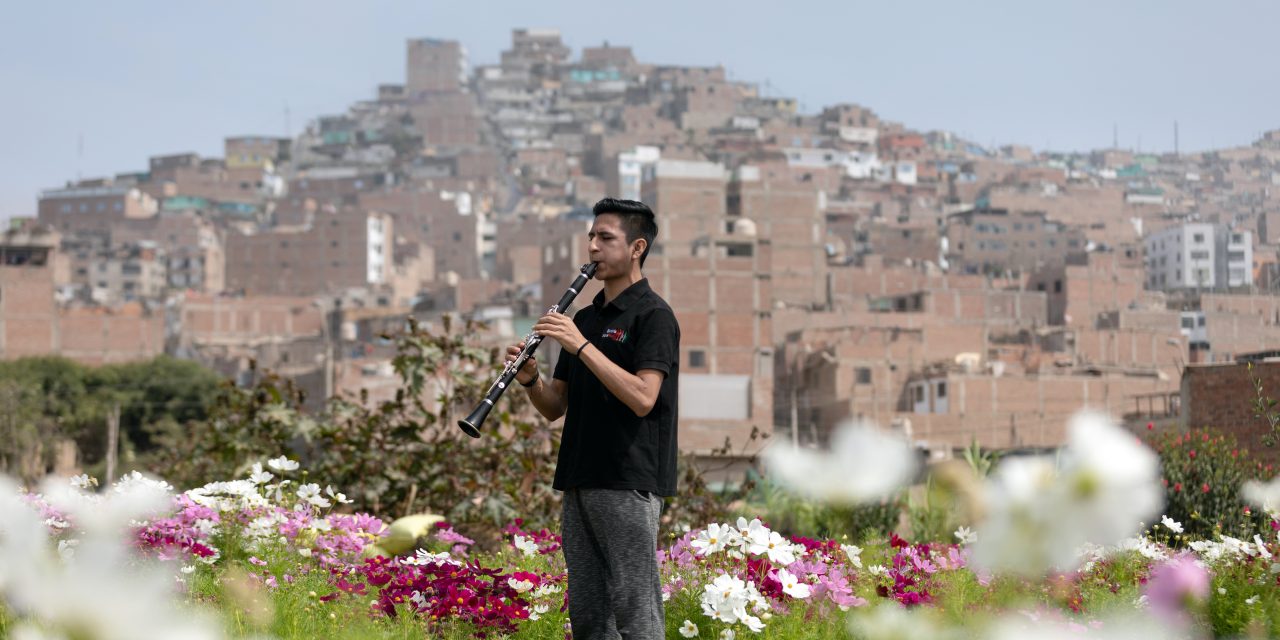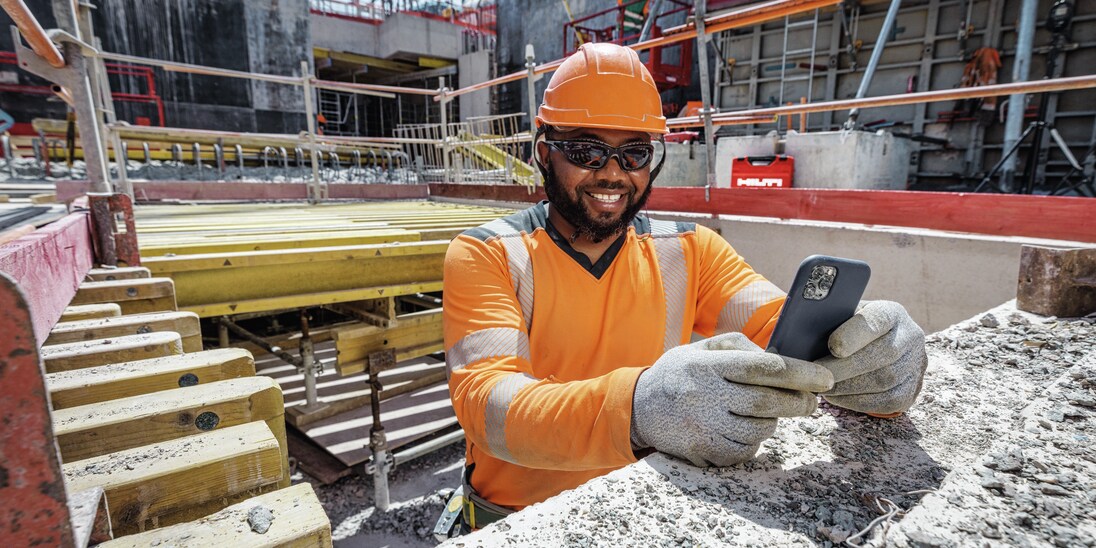- Home
- Company
- Newsroom
- Hilti Stories
- Volunteer Experience: Building Houses in Srebrenica

Volunteer Experience: Building Houses in Srebrenica
An Engaged Beyond Business Story
Produced by the Hilti Foundation | December 7, 2023
Philanthropy and contributing to the communities in which we live are becoming more and more important in today’s world. Hilti recognizes this need and encourages its team members’ social commitment through the corporate volunteering program Engaged Beyond Business (EBB).
The goal is to provide every Hilti team member worldwide with opportunities to participate in social and environmental initiatives that go beyond the company’s day-to-day business. One such example is the “building houses” program run by the Hilti Foundation.
Aron joined Hilti as an intern in September 2023. During his first week, he participated in an EBB program which took him to Bosnia and Herzegovina where he and other Hilti team members built a house for a family in need. Looking back, Aron remembers what he heard about the program during his interviews:
“At that time, all I knew was that Hilti wanted to give back to the community and help people where they need it the most. Coming from an area of Hungary that, to put it lightly, could also benefit from some investment, I thought that this was a great initiative that touched me personally. I wanted to be a part of that effort, and when the opportunity came, I signed up – and started packing.”
Aron shares about his challenging but rewarding experience from the EBB trip:


Arriving in Bosnia and Herzegovina
We flew from Zurich to Sarajevo very early in the morning. At the airport, I had the pleasure of meeting my fellow Hilti team members as well as Bea, the “mother” of the international EBB projects. Bea has already been to Bosnia countless times as she was the one who started this specific program back in 2014. It is safe to say that she knows the area and the streets of Sarajevo like the palm of her hand.
She also served as our unofficial tour guide through the city – introducing us to the local culture and cuisine, taking us to drink Bosnian coffee and exploring the old town of Sarajevo. This way of spending the first half day together was the perfect opportunity to get to know everyone in the group.
Although, technically, Bea had the role of a supervisor who oversaw everything with her experience, we all felt like she was more of a glue that held us together and made sure that everyone was having a good time. Whenever we sat down and it was time for a conversation, she would tell her funny stories from previous projects or share some interesting moments from her career.



Learning about history
After taking in the city of Sarajevo, it was time for a three-hour drive to Srebrenica, where we would be building houses over the next few days. The location was not chosen coincidentally: During the Yugoslav War of the ‘90s, this area suffered extensive destruction and 8,372 people fell victim to war crimes.
To try to get a grasp of what had happened, we visited the Srebrenica Memorial Center. Learning something about a historical event is one thing, but being there, observing the white tombstones and the names carved in granite is a completely different experience that cannot be put into words. Almost thirty years after the end of the war, it is still a very somber feeling. We fell silent as we realized the true scale of what had happened right where we were standing.
This visit flipped a switch in me: My initial intention when I signed up for the EBB program was strong but very undirected. After visiting the memorial, however, I knew what I needed to focus my efforts on to make a difference. My desire to help the local people build their homes was no longer an abstract goal.






Starting work on site
On Sunday evening, we arrived at our accommodations and were greeted with the local spirit before having dinner with Namir, the director from our local partner organization “House of Good Tones” (HOGT). Before the building work began the next day, we were divided into three teams, that would each build a house within a week.
When my team arrived at the building site on Monday morning, we found an almost empty house foundation lying in front of us. I remember the disillusioned looks on my group mates’ faces when they saw that slab of concrete. We were all thinking, “How are we going to turn this into a house in a week?”
Thankfully, we were not on our own. In addition to Bea, we were supported by Bosnian construction workers, who knew where to place each nail by heart. We began to build the house under their guidance. Without any previous experience in building a house, we did not quite know what to do. Couple that with a language barrier and you get a truly fun experience that will be remembered for a long time.
Initially, we relied on the only two people at site who spoke either Bosnian or Croatian to act as translators. But given that there were 10 of us, we had to invent new ways to communicate on our own. We quickly adopted “super dobro” as a way of saying “very good”, and “problem” as a way of saying that we needed support. And if that wasn’t enough, there were hand gestures to fill the remaining gaps.
Although I’m sure we tested the Bosnian workers’ patience quite a bit, we grew closer with every interaction that took place.




Building hand-in-hand with locals
We started by putting up the walls and laying down the floor beams of the house. By the end of the first day, we even started setting up the frame for the roof. Within nine working hours, the plot went from just a foundation to looking like something a person could live in. The pace of progress was incredible, and just as much as it surprised us, it also motivated us to put even more work in and make this happen.
Every morning, we started with local Bosnian coffee provided by the future owners of the house: Nermin and his wife. Before starting the day’s work, we had a little chit-chat, assessed what needed to be done and laid out the structure for the day.
The working hours passed by in a heartbeat, as we were laughing, sharing stories and hand gesturing with the local construction workers. At one point, they started calling us “Kollega” – meaning colleague but used as coloquial word for “buddy.” This was the moment we knew we had earned the highest level of their respect.
For every lunch, we sat together with the workers and the future homeowners who provided us with an incredible amount of delicious local food. We were always amazed by their generosity and truly enjoyed it. It really seems that the less they have, the more they give.

Building a better future
Before I talked to Nermin a house carried the meaning of “real estate”. A place to go back to at the end of the day and get ready for the next one, with no particular emotional attachment or meaning. For Nermin, it is a cornerstone of life and well-being. A starting point. I did not understand at first, so I asked him to share his perspective.
He told me to take a look around and said: “This is where my family is from, where my family lived before. They’re not with us anymore, they were killed during the war, but when I’m here, I feel them around. With this house, it looks like they are around. Now I can come here and live. It will change everything.”
Needless to say, my point of view has completely shifted. While most people are trying to get out of Bosnia, Nermin came back to his birthplace after spending 20 years living a good life in Canada. He lost two of his family members in the war and almost fell victim to the genocide himself. According to him, Srebrenica is the place that he can call home and where he wants to raise his child.
Houses in the region, along with his, were badly damaged during the war and left unrepaired. The plot on which we built Nermin’s house belongs to his wife. Meanwhile, his former house was only about 300 meters up the same road but was surrounded by a minefield; therefore, he could not get to it.
On the road to his worksite, I remember seeing the destruction the war has left and a mix of occupied and abandoned, damaged houses. It was an eye-opening talk with him that made me see what symbolizes value in his eyes and the sacrifices he is willing to make. I was beginning to understand why it is so important for Nermin to have this house, how it will change his future and how we can support him to make it happen.
A new perspective
Taking part in this program was the best onboarding experience for my internship at the Hilti Foundation. This valuable experience made me understand why Hilti and the Hilti Foundation are so dedicated to building a better future.
Even more so, I also gained a new perspective after talking to Nermin. That perspective made me re-evaluate some things in my own life. He does not determine happiness by who has more, but by who needs less.
It was empowering to see the joy on the faces of the future house owners and to feel the gratitude each of them were expressing in their own ways as their houses were being built. I enjoyed sharing this experience with my future colleagues and will remember this week as a wonderful memory I will gladly look back on.
Get to know: Aron Polcsik
Name: Aron Polcsik
Hometown: Szombathely, Hungary. Now living in Dornbirn, Austria
Age: 23
Profession: Student of Creative Business at NHL Stenden, Leeuwarden, The Netherlands
Current position: Intern Communications at the Hilti Foundation for eight months
Daily tasks: Content writing, photo and video creation, editing, publishing
Interests/Hobbies: I am a photographer. I like travelling trying to document the feeling instead of the sight.
My future vision: I want to use what I learn during my internship for my personal and professional growth.
Hilti Foundation and Engaged Beyond Business
Engaged Beyond Business is Hilti’s corporate volunteering program, launched together with the Hilti Foundation. Globally, all Hilti team members are encouraged and provided with the necessary support to invest time and money in social and environmental projects. EBB activities consist of local programs and initiatives run by the respective Hilti organization, as well as international programs funded and managed by the Hilti Foundation like the “Building Houses” program. There Hilti team members help families in precarious housing situations with no possibility of improving their living conditions in Bosnia-Herzegovina, Romania and, from 2023, also in the Philippines.
Since 2014, the following figures have been achieved in Bosnia and Herzegovina:
206 Houses built
1,005 Team members involved
576 People got new homes
40,200 Working Hours invested by Hilti team members
House of Good Tones
House of Good Tones (HOGT) is an organization that helps the youth of the Srebrenica region in Bosnia and Hercegovina get access to high quality educational, cultural and entertaining programs. Founded on the basis of multiethnicity, it is a hub for young people to freely develop by taking part in innovative projects and learning from each other, in turn helping the local community. The HOGT got in contact with the Hilti Foundation in early 2014, which was the starting point for the Hilti Foundation’s “building houses” initiative.


